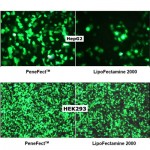Hot Products
Top 100 Antibodies
Customer Testimonials
"I was having some issues with Phire Direct PCR Kits. I tried out your LiDirect™ Lightning Genotyping Kit and it worked great! Thanks y'all!"
"The LiDirect™ Lightning Genotyping Kit that I sampled gave clear results and was much more efficient than the methods my lab had been using in the past. With the buffer that is included in the kit, there is no need to make an extraction buffer. Additionally, the quick extraction step (just 15 minut..
















